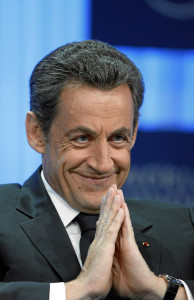The Republicans Trying to Show Unity Ahead of French Regional Elections
The national party summit of The Republicans, France’s center right party, was held in Paris on Nov. 7. With the French regional election set to be held on Dec. 6, this summit could have been an opportunity for Nicolas Sarkozy, party leader and former French President, to unify the political sub-divisions within The Republicans into one cohesive party voice. In practice, however, the summit summed up the lack of cohesion and consistency within the party, with most of its figureheads eying the nomination for the presidential elections in 2017 instead of focusing on the upcoming regional elections.

While every candidate running for the regional elections was present, most of the party leaders challenging Sarkozy for the presidential nomination of The Republicans were absent. Le Monde reports that Francois Fillon, former Prime Minister and candidate for the presidential primaries, was travelling in Reunion, and that Sarkozy’s main threat, Alain Juppé, was absent as well. Another candidate, Bruno Le Maire, attended the conference but was uncharacteristically quiet. The absence of some of the party’s main figureheads, deciding to focus on their own presidential nominations instead of attending one of the most significant party events of the year, reinforces the discord gripping the party.
While at the national summit, Sarkozy desperately tried to hold the party together, reinforcing in his speech that “twenty nine days before the regional elections, [he] won’t accept any exceptions to unity, may they be in the regions, in the departments, or at the national level.” His message was aimed, in particular, at his direct opponents whom he accuses of prioritizing the presidential primaries, to be held in mid-2016, at the expense of the imminent regional elections.
Even candidates of The Republicans running for regional presidencies have openly challenged Nicolas Sarkozy. The most virulent has been Dominique Reynié, a former political scientist who recently joined the party and is running for the presidency of the Languedoc-Midi-Pyrénées region. Sarkozy allegedly tried on multiple occasions to reason with Reynié, but to no avail.
While the French population’s growing discontent for incumbent president Francois Hollande and his Socialist Party (PS) is likely to help The Republicans win several of France’s thirteen regions, the National Front (FN), France’s far right party, is also gaining ground. The lack of unity among The Republicans is damaging its reputation and effectiveness. The party should embrace the discontent of the French population and present itself as the main opposition to the Socialist Party. The reality, however, maybe an ever-growing National Front that threatens to win regional control for the first time in its history, in addition to being favorites in the 2017 presidential elections.
Even efforts to develop a strategy to combat the National Front has caused discord within The Republicans. Traditionally, the Socialist Party and The Republicans would unite against the National Front, creating what was called a “republican front.” Sarkozy broke this tradition in 2015, calling for abstention in the case of the run-off between the Socialist Party and National Front presidential candidates. Recently, however, many of The Republicans’ candidates in the region have reopened the possibility of a “republican front,” creating further strategic discontinuity within the party.
The lack of unity could cost The Republicans not only several regions but also several voters as the varied factions in the party make themselves heard. Their failure to capitalize on the shortcomings of the Socialist government benefits only the National Front. The Republicans are especially afraid that, even if the National Front wins only one region in the upcoming regional election, it could use the historic result to its advantage in the presidential elections in 2017.
